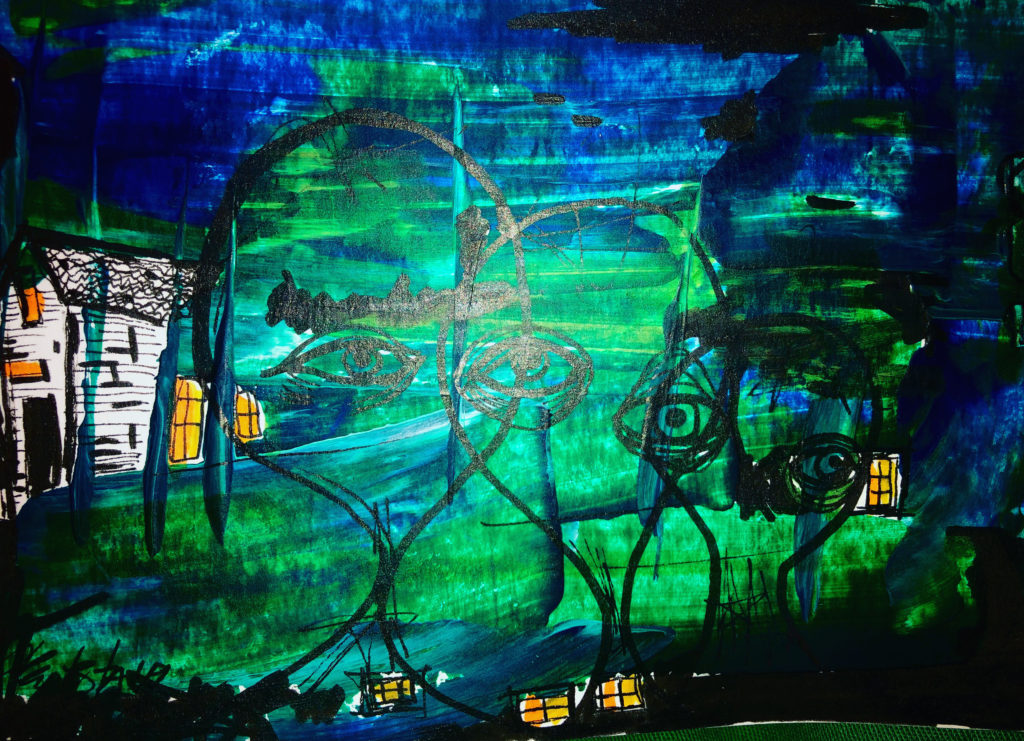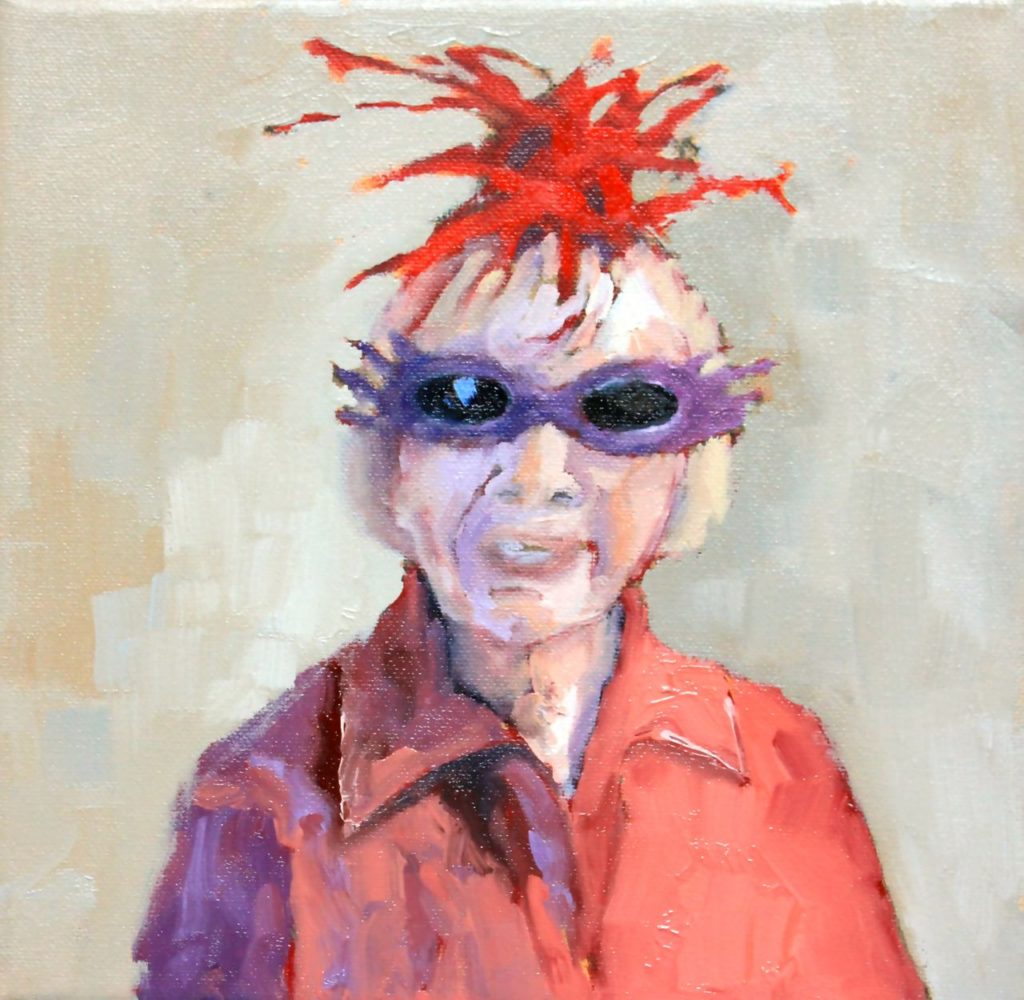I need you to listen now, just listen. I’m going to tell you the story of how we survived the August blizzard. We both need to know this story so that we remember: you and I are survivors.
Before the storm, when you were still a brand-new person, in those weeks of late summer when the barometric pressure was high and the sky clear blue, we stayed mainly in the big park where there’s a real forest and a river. The afternoons were so warm, and the nights cool for sleeping. There was plenty to eat—wild carrots and cattails and so many blackberries. And the cook at the canteen always gave me the leftover soup. Your cheeks got chubby and rosy and every day you seemed to feel a little heavier in my arms.
When the snow started, falling straight down, I heard people saying how pretty it looked. Later, when the flowers were all broken and bent and covered over, the wind came. The snow on the ground was too heavy for the wind to pick up, but it drove the falling snow sideways, slamming it into faces and bodies and cars and buildings.
I didn’t plan for us to go to the mall. I was trying to get to the little adobe house at the community garden across the street from the mall. It’s squat and sturdy, close to the ground. Less likely to blow away or be bashed in by a falling tree. I thought if I could block the doors and windows with wood and snow we could get enough shelter from the wind.
It took us over an hour to walk there. We’d have been faster if we’d left my cart behind, but I couldn’t do that. A few times, I had to hold on to the cart with both hands to keep myself from being blown away. You were safely tucked into my big coat. By the time we finally made it to the garden, I knew we needed to be inside a real building.
I don’t like the mall. I’ve never felt safe there. But I knew there would be water, and food, and maybe heat. At least for awhile. We hid the cart in the underground parking garage, way over in one corner, behind the garbage bins under a ramp. I took out what I thought we might need, threw the tarp over the rest, and said a prayer. Then we climbed the smelly concrete stairs into the mall.
Outside it was all roaring wind and snow. Inside there was a totally different kind of roaring and I think it scared me more. So many flashing lights and sounds and overwhelming smells. In the food court people were stuffing their faces with ketchup-y fries and messy burgers, fried chicken, horrible orange sweet and sour sauce, tubs of bubble tea. Maybe they were trying to forget about the mess outside or pass the time while they waited for it to stop, or just filling their bellies while they had the chance. Above the food court, the huge tv screen was showing ads for holiday cruises and anti-aging cream and the latest kind of phones.
I’d wanted to be a tv weather girl when I grew up. Grandmother used to let me practice whenever I stayed over at her house. I would stand in front of the big map on the wall in her library and use the yardstick to point to places where I said there were “weather events.” Watch for trends, Grandmother advised. Notice how things are changing.
Grandmother always refused to go to the mall. She said it made her feel dirty. The only time she took me I was seven years old and I begged her to let me see Santa Claus. We waited in line for twenty minutes before she hauled me out by my coat collar and never went back.
By the time the power went off, you and I had found a good hiding place in the family bathroom, near The Gap. Each time we went out there were fewer people. I don’t know where they all went. Maybe they were in the parking garage. I wondered if I should check on my cart, but it felt too risky to leave our hiding place for that long. The emergency generator lasted only a few more hours.
We were still in the bathroom when the skylight collapsed into the food court. The sound woke me from a light sleep. A deep groaning then sharp cracks, like the sound when the thunderstorm is right over your house. A terrible clap. I heard a voice yelling, the roof, the roof! Then a screechy grinding. I pictured the metal frame of the skylight twisting and breaking. Then horrible crashing and thumping as if a dump truck had unloaded tons of boulders onto a glass table top. I held my breath, and maybe you held yours too, like we were deep-diving together. I didn’t breathe again until there was silence.
When I thought things had settled down enough to be safe, we went to have a look. All the tables and chairs were buried. I noticed a corner of the giant TV screen sticking up out of the snow mountain. But I didn’t see any body parts. I stood for awhile, just staring up at the open roof, shocked by how wonderful the fresh air felt, and how strange the wind sounded, whistling in circles above us. The sky was the colour of rotten potato.
That’s when Spider and Mavis came out of the WalMart and found me. I didn’t know they were in the mall too. I used to see them at the shelter sometimes. I knew they were good people. They offered me some of the juice they had, and some butterscotch candies. Spider jumped a little from foot to foot. He said he was just looking for some pain killers. I think Mavis could tell I was hiding you in my coat, I saw her looking down at my body with a sad smile, and then back at my face.
After that, we started spending more time out of our hiding place. Even though the snow and wind kept coming in through the hole in the roof, it was a comforting reminder that the sky was still out there. Someone started a fire in a garbage receptacle and people brought scraps of anything burnable to keep it going. The smoke floated up and out through the broken roof.
I heard a woman say that the snow is a plague sent by God to punish us. Spider said it’s the government’s fault. Mavis said her brother used to work for a company that flies those weather bombers—cloud seeders they call them. She said that her brother has made lots of weather, but never a storm like this. Spider said they were trying to make it rain because of the wildfires, and the drought, but they screwed up and made it snow instead. It’s too full of water, he said, it’s not frozen enough. That’s why it’s so heavy. Why the buildings are collapsing. Plague woman says only a God who loves us would send such a terrible destruction. God wants to purify us, she says.
But snow is just snow. I knew it would melt the way snow always does. And then we could start again.
I didn’t know how much longer I could keep us warm enough, though. I lined our little den with the shiny emergency blankets that I found in the camping store; I burned one of our candles for two inches before we went to sleep, then another two inches when we woke up again. The blankets reflected back the candlelight and you gazed up at it without blinking. But yesterday morning you had frost on your eyelids. I had to breathe on them before you could open your eyes.
Last night I dreamed about Grandmother’s mink coat. I was small again, in the dream, not tall enough to open the closet door. She was there, and she lifted me up so I could reach the knob. Inside, the coat floated in the centre of the empty space, not on a rack or a hanger, just suspended in the air, hovering above me. I reached up to touch it and when my fingers felt the hem, heat flowed down my arm into my shoulder and filled my whole body. I felt my muscles relaxing, my blood vessels and lungs expanding and oxygen flooding my brain. I felt as though I were filled with sunlight—not just shining on me, but actually inside me, radiating out. I could have heated a whole continent. As soon as I let go, the feeling ended and the cold returned.
I woke up with a plan. If Grandmother’s house was still standing, I could get the coat and we might have a chance. I knew that when the snow melted we could dig up the potatoes and carrots left in her garden. We could be warm and fed.
We had to get out of the mall. We had to believe we’re survivors.

Mi Casa es Su Casa by Flavia Testa


